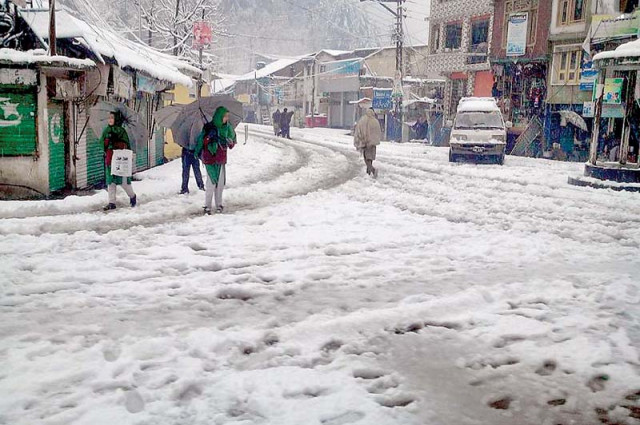K-P extends winter vacation for schools amid new cold wave
According to PMD, cold wave will grip most parts of country from Wednesday with decrease in night temperatures

Snow covers a road in the Alpuri after the first snowfall of the season. PHOTO: INP/FILE
“The competent authority has been pleased to extend the winter vacation in summer zone up to 12-01-2020 (Sunday) due to harsh cold weather in the province,” according to an official notification.
The government schools would reopen on 13 January (Monday), the it added.
Cold wave will grip most parts of the country from Wednesday with decrease in night temperatures after the rain spell ending on Wednesday, the Pakistan Meteorological Department (PMD) forcast.
PMD Director Zaheer Ahmad Babar said that the weather will remain dry after Wednesday and cold wave will persist in most parts of the country during the next few days.
The decision comes amid predictions of widespread rain and snowfall in K-P, Punjab, Islamabad, Azad Jammu and Kashmir, Gilgit-Baltistan, Balochistan and isolated places in upper Sindh.
Winter vacations extended for schools in Punjab
A day earlier, the Punjab government in a similar decision announced that all public and private schools would remain closed for an additional week.
The extension was notified by the Punjab School Education Department on Monday. “The schools will remain closed from January 7 to 12 and will reopen on January 13.”
Climate change – the winter snap
In the last 50 years, the annual mean temperature in Pakistan has increased by roughly 0.5°C. The number of heatwave days per year has also increased nearly fivefold in the last 30 years. Annual precipitation has historically shown high variability but has slightly increased in the last 50 years.
Sea level along the Karachi coast has risen approximately 10 centimetres in the last century. By the end of this century, the annual mean temperature in Pakistan is expected to rise by 3°C to 5°C for a central global emissions scenario, while higher global emissions may yield rise of 4°C to 6°C.
Average annual rainfall is not expected to have a significant long-term trend but is expected to exhibit large inter-annual variability. Sea level is expected to rise by a further 60 centimetres by the end of the century and will most likely affect the low-lying coastal areas south of Karachi towards Keti Bander and the Indus River delta.
Under future climate change scenarios, Pakistan is expected to experience increased variability of river flows due to increased variability of precipitation and the melting of glaciers.
With additional input from APP



















COMMENTS
Comments are moderated and generally will be posted if they are on-topic and not abusive.
For more information, please see our Comments FAQ